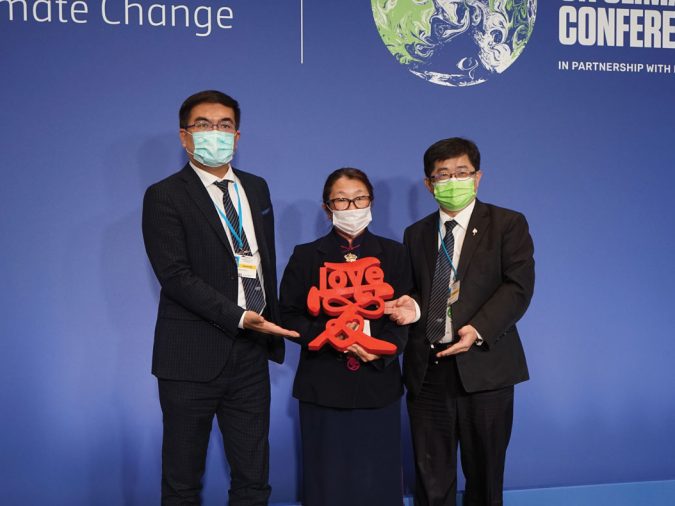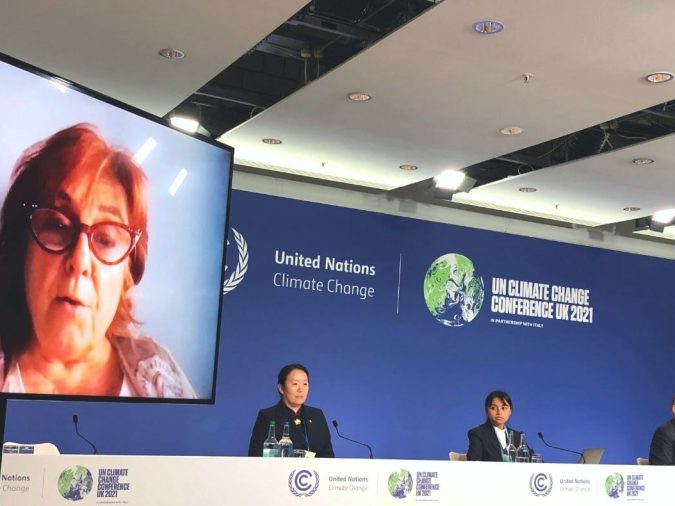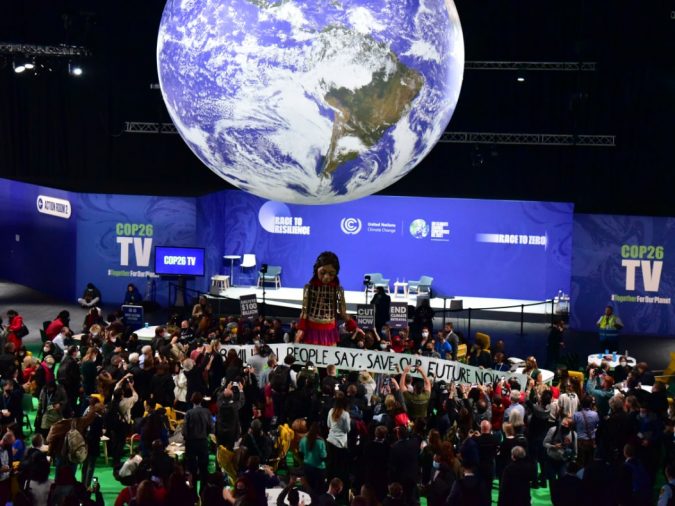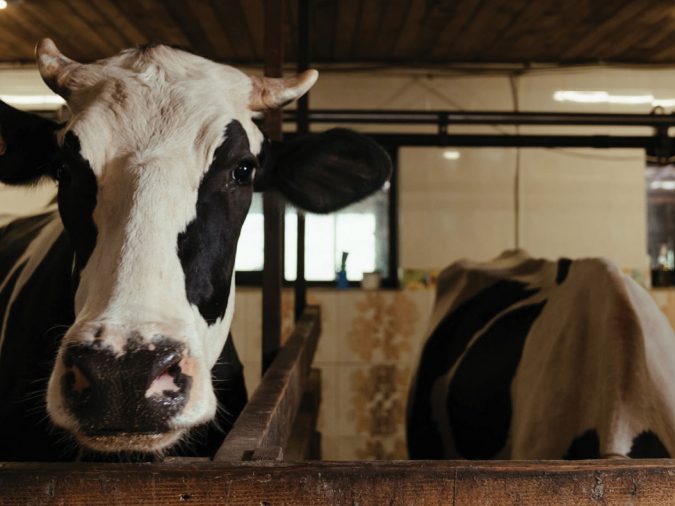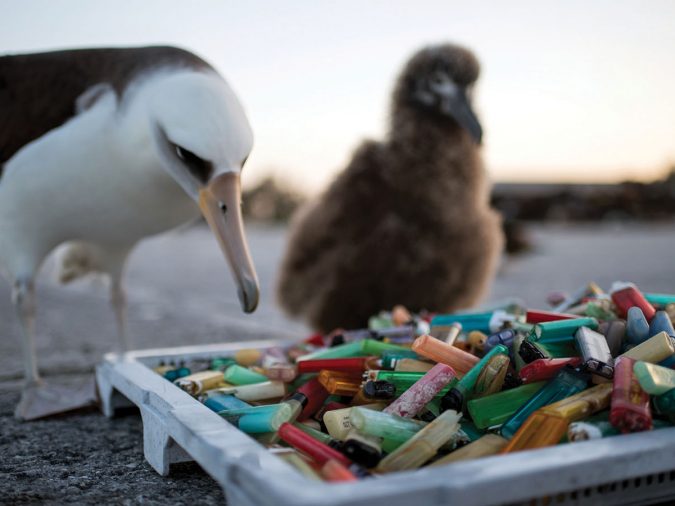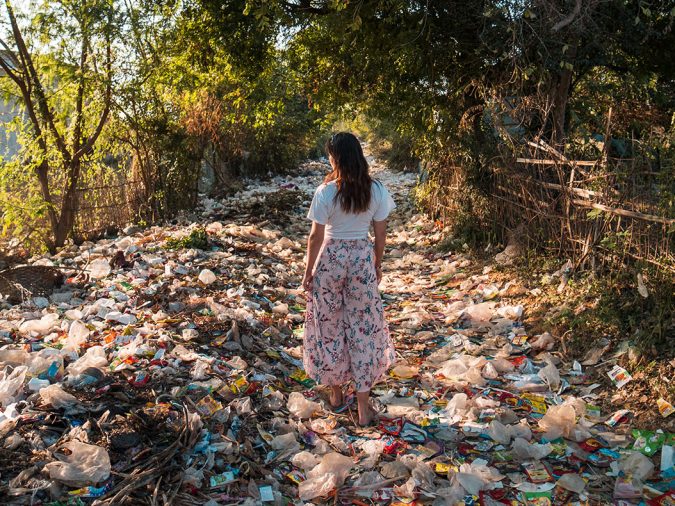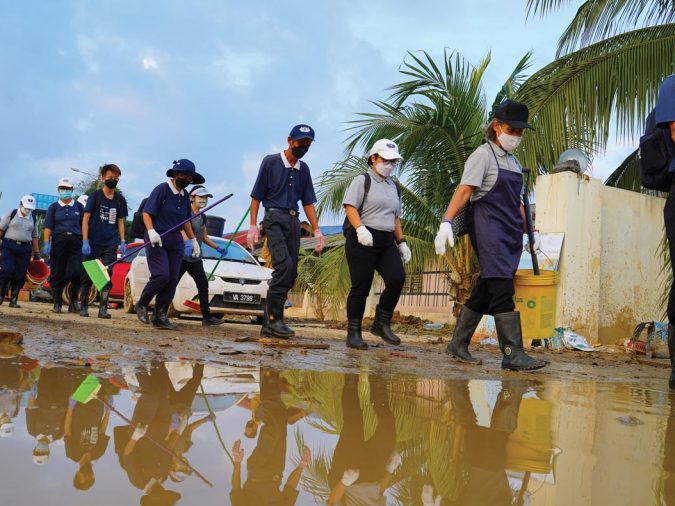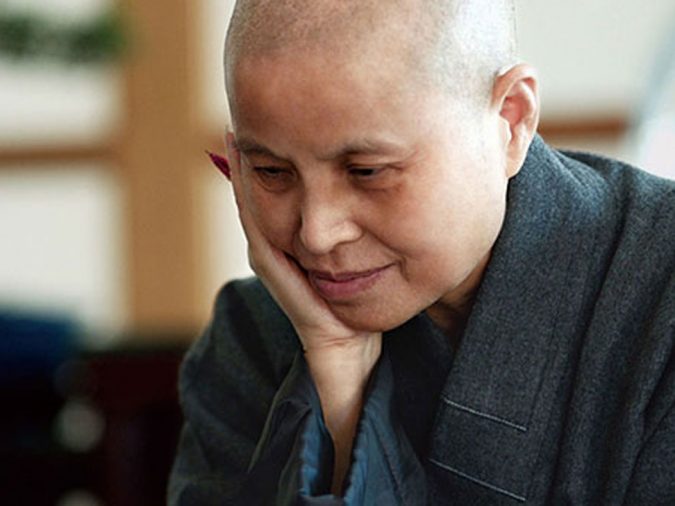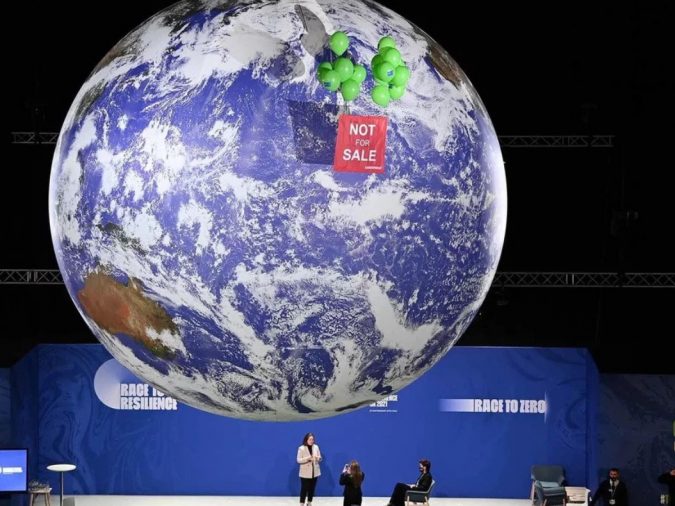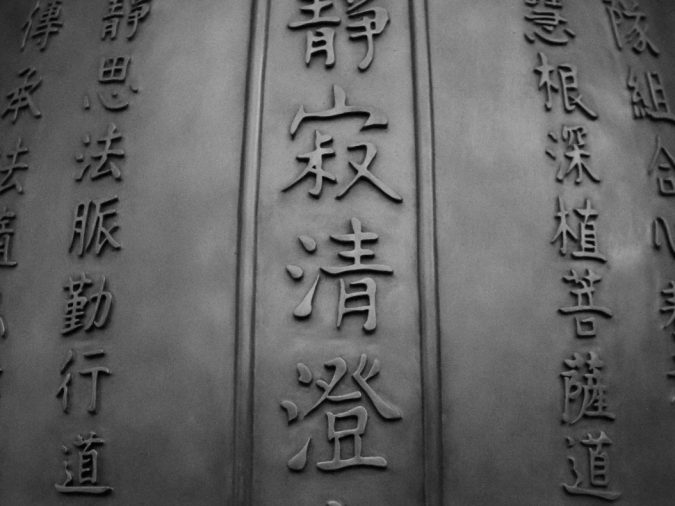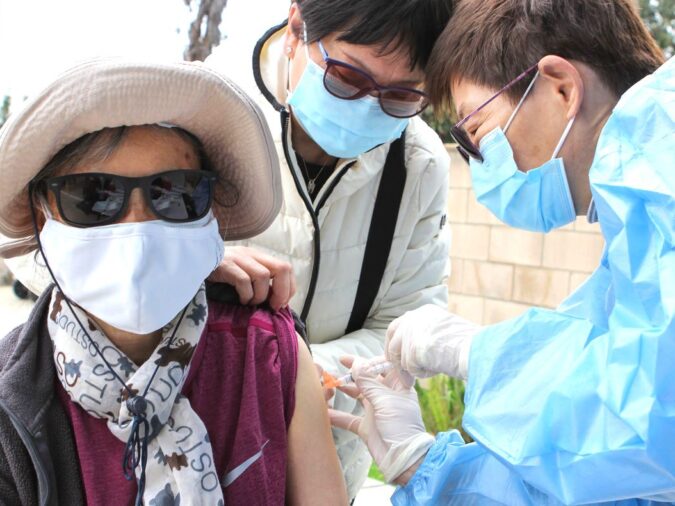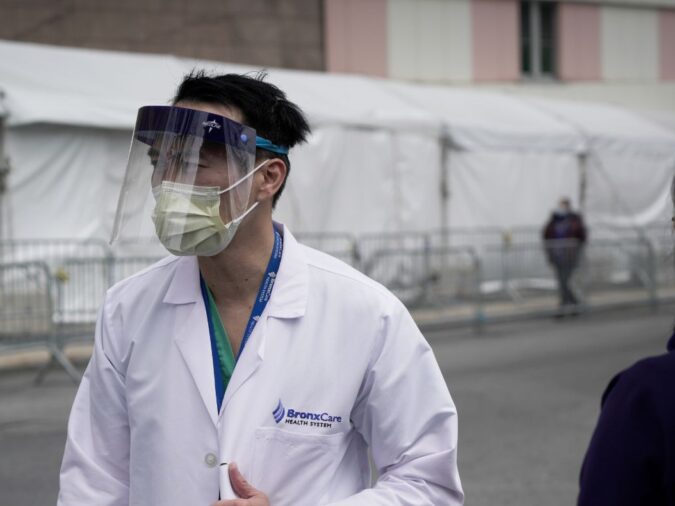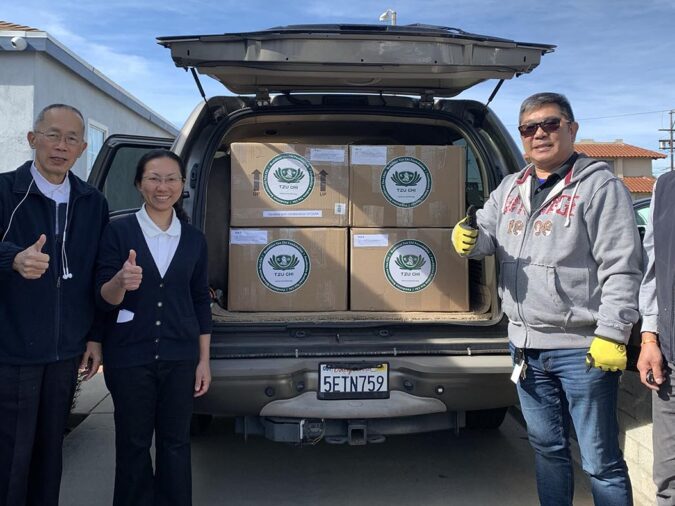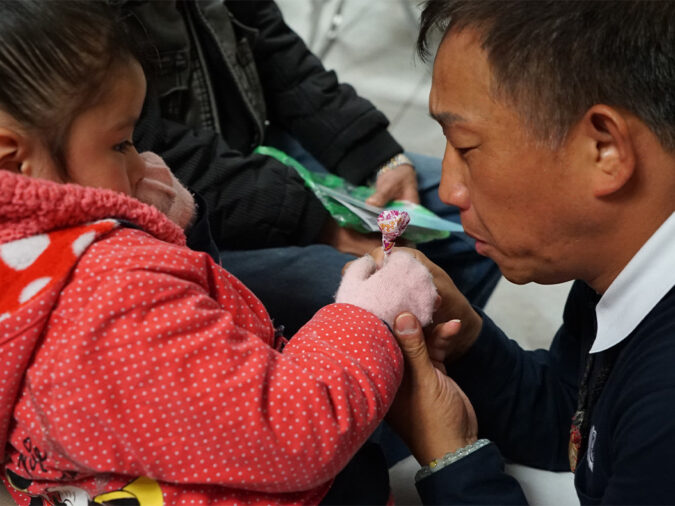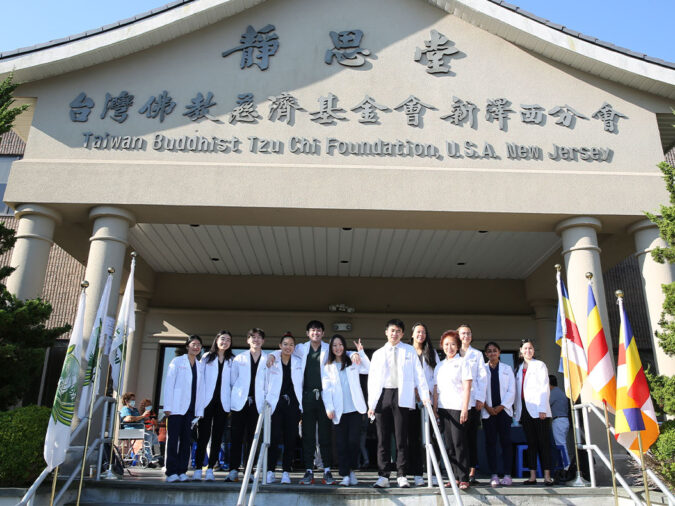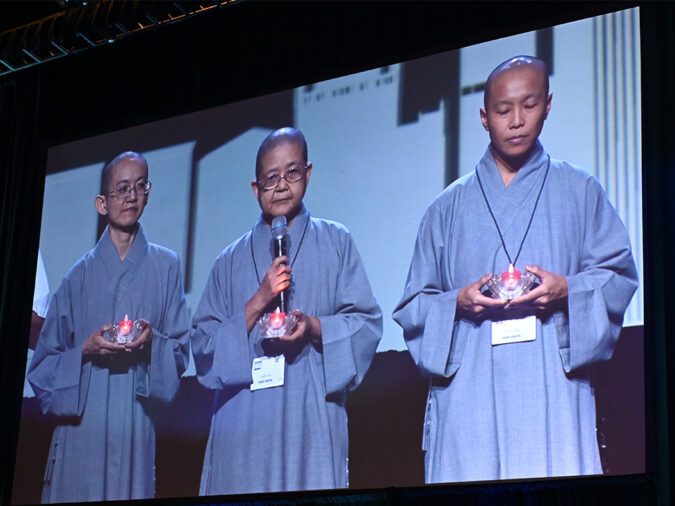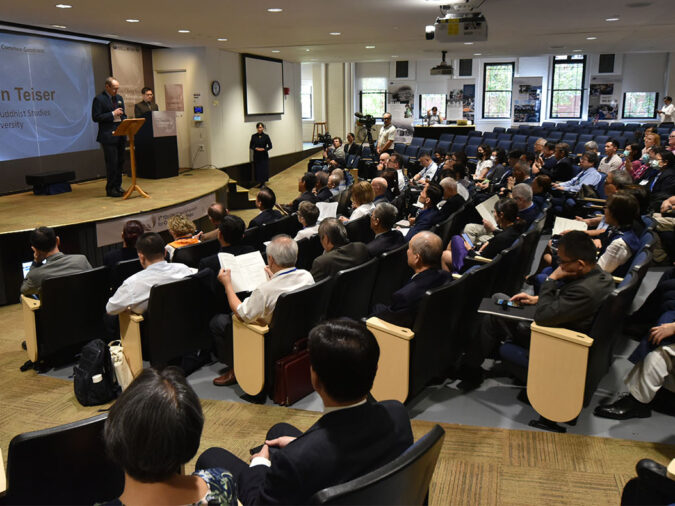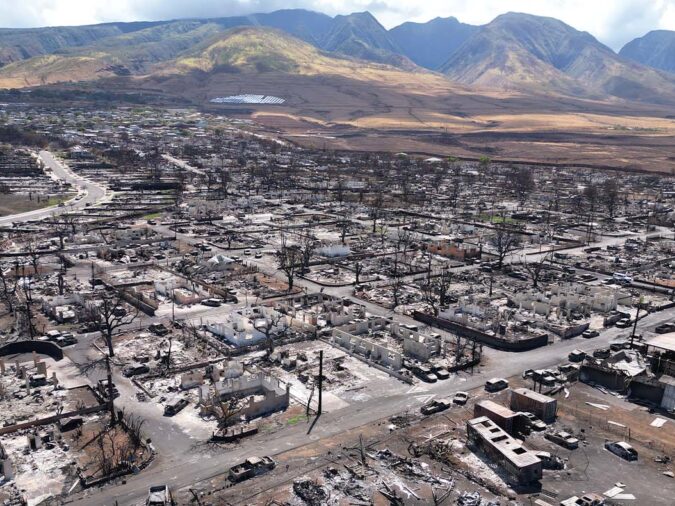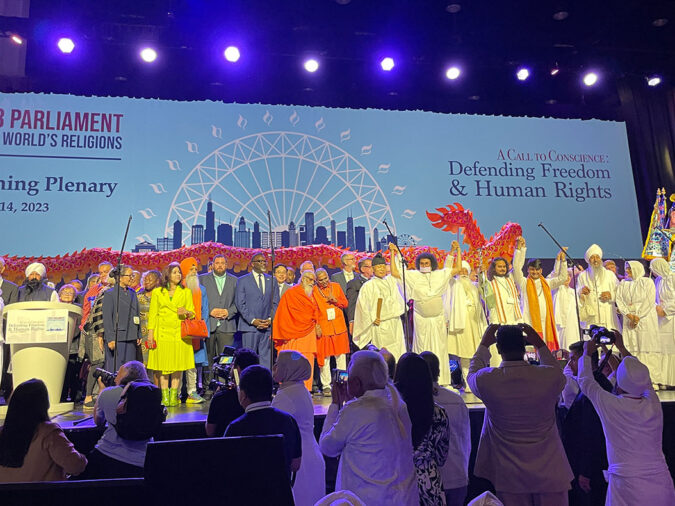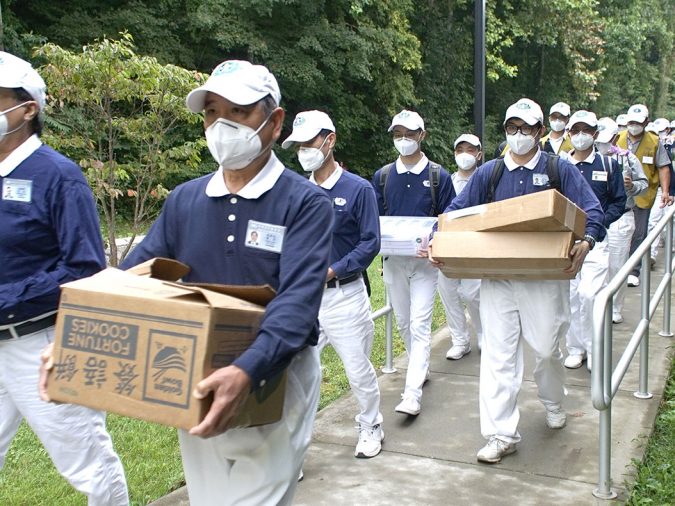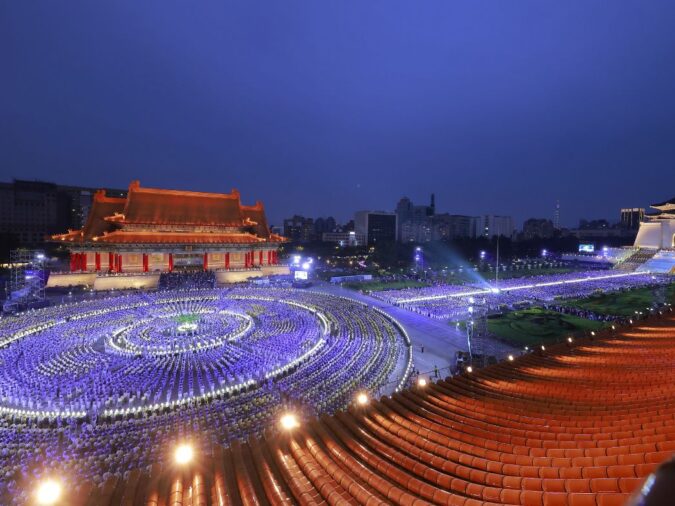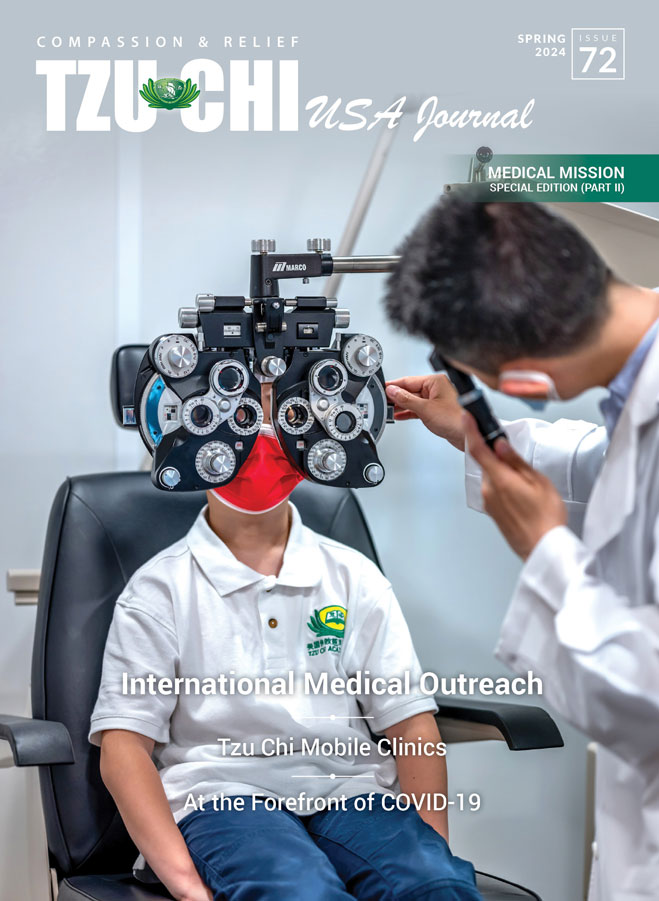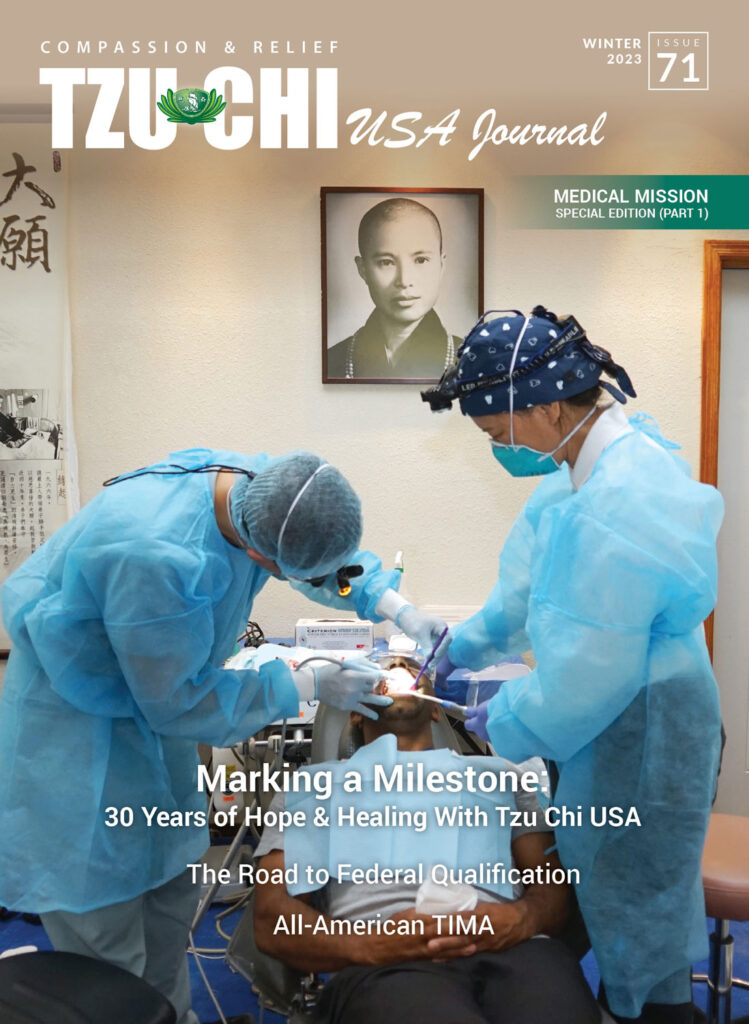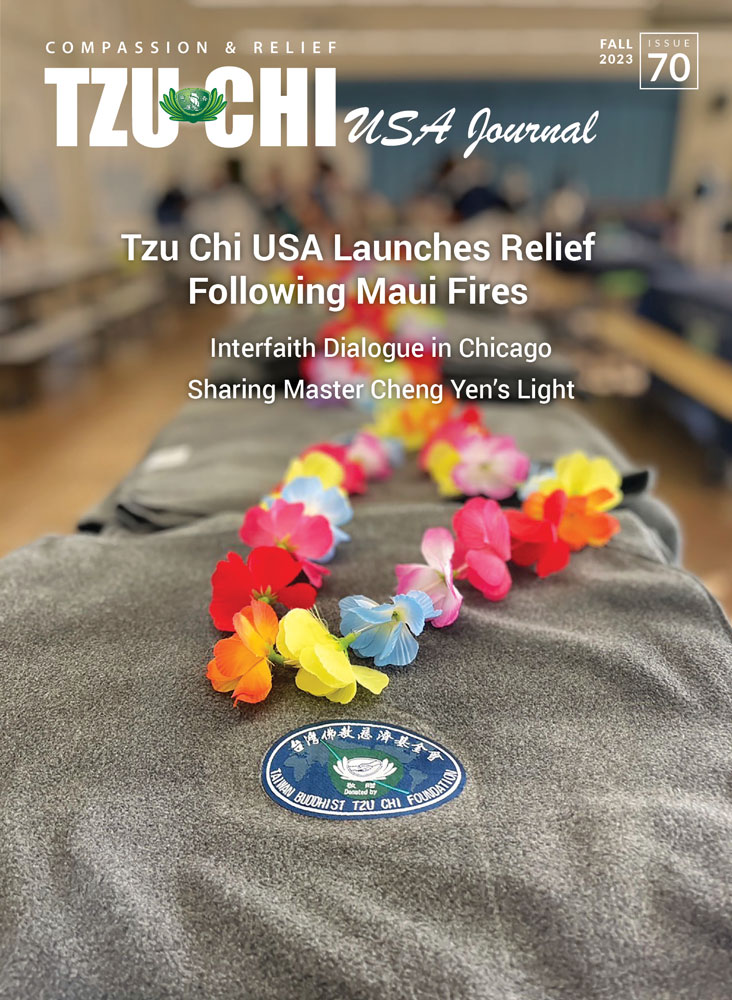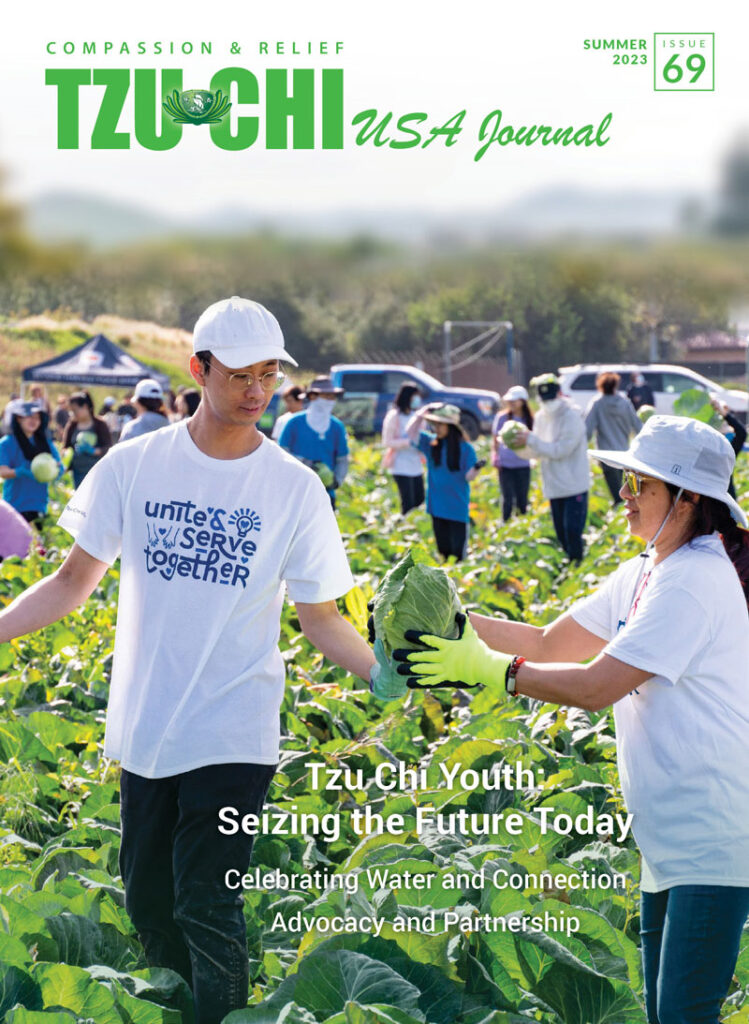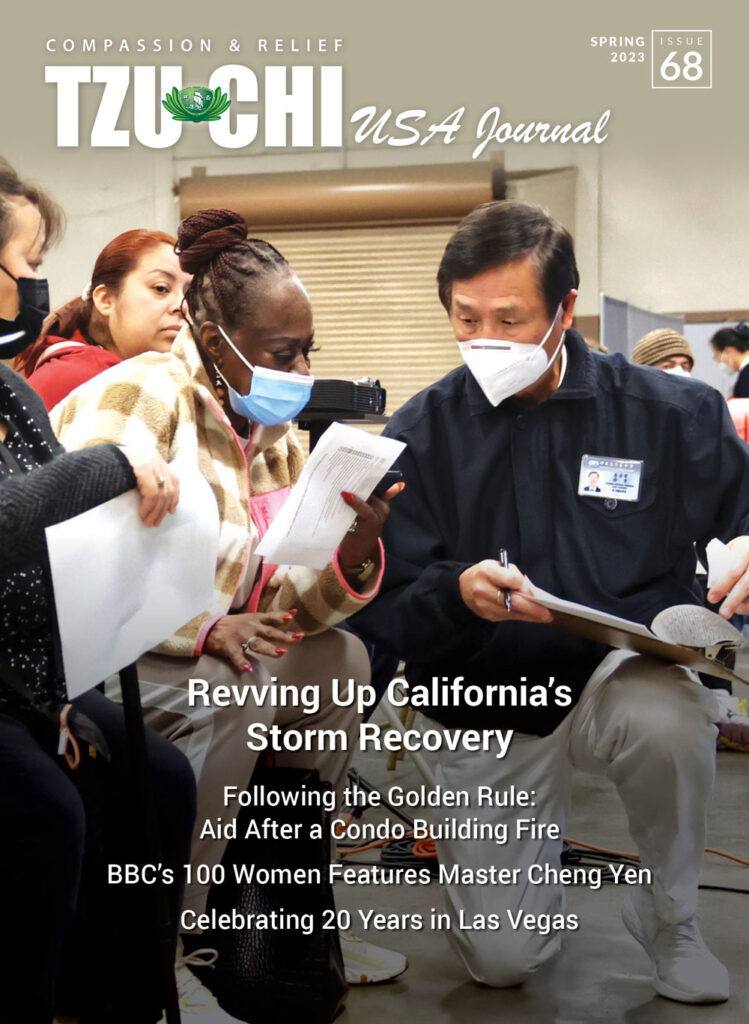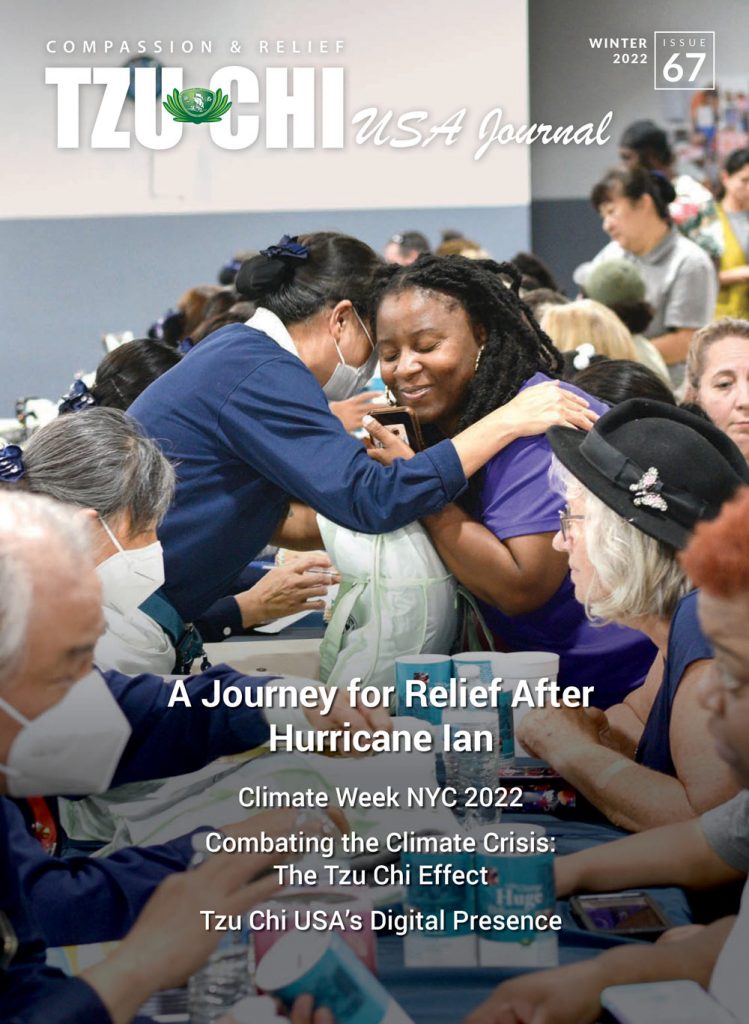The Tzu Chi delegation marks their participation at COP26 with a group photo.
By Ida Eva Zielinska
Photos by Tzu Chi SDG Action Team
Published #63 | Spring 2022 Issue
SHARE
We asked the Tzu Chi Sustainable Development Goals (SDG) Action Team to share its reflections after participating in COP26, the 26th Conference of the Parties in Glasgow, Scotland. The summit drew together the Parties, signatories of the United Nations Framework Convention on Climate Change (UNFCCC), and over 38 thousand delegates from around the world to address the global climate crisis.
Jimmy Yang, lead of the Tzu Chi COP26 delegation, has been on Tzu Chi’s UN team the longest. His first summit was COP20 in Lima, Peru in 2014 – a “life-changing experience,” he said – and he’s attended each climate conference since then. He joined the panel at one of Tzu Chi’s press conferences at COP26 as Special Project Lead on aid in Zimbabwe.
What drew me to the UN Team was the opportunities provided for me to be involved in addressing major global issues and work in collaboration with others to find a solution to these issues.
— Jimmy Yang
Tzu Chi volunteers and married couple Jan Wolf and Mea Feng Lin have been delegates at several COP summits together as both are members of Tzu Chi’s UN SDG Action Team.
Jan and I understand the climate emergency. If all of humanity doesn’t take immediate action, the whole world will face more disasters, casualties, and losses.
— Mea Feng Lin
Everyone was in action mode at COP26, she said. “The team [was] in the spirit of mission fulfillment, working closely together, using wisdom and perseverance to make daily activities go smoothly and successfully so that Tzu Chi can exert the greatest influence in this climate meeting.”
The 2017 COP23 summit in Bonn, Germany, was Jan’s first, and he’s actively participated in subsequent years. He moderated two Tzu Chi press conferences this time, on topics gravitating around weather and land-related issues and Africa’s food crisis.
“I’ve always been concerned about environmental protection and the impact of our actions on the environment. I’m glad to be part of a team which aims to promote the good practices of Tzu Chi to a global audience of policymakers.”
— Jan Wolf
Ashley Yong, Tzu Chi’s Civil Society Youth Representative to the UN Department of Global Communication, became part of the team three years ago, and this was her second COP summit. She spoke at two press conferences and one side session, bringing a perspective on youth action and, as a program manager, sharing about Tzu Chi’s aid in Sierra Leone.
Participating in COP has taught me more about the challenges and complexity of the climate change issues.
— Ashley Yong
And for Tiffany Tu, this was her first COP since joining Tzu Chi’s Global Partnership Affairs Department (formally known as the United Nations Task Force) in 2020. She opened Tzu Chi’s final press conference featuring interfaith reflections on COP26 and the road forward. Overall, the summit was eye-opening:
What left the biggest impression was the multisectoral and multilateral dimensions of the attendees from NGOs, governments, academia to corporations. This highlights the global scale and seriousness of climate change.
— Tiffany Tu
A Milestone to Celebrate
As a Buddhist faith-based non-governmental organization, the team felt that Tzu Chi has a unique role to play at United Nations climate conferences.
NGOs in the environmental and climate space tend to be engaged in advocacy, working with policy-makers, writing statements, and putting pressure on governments to make decisions which are beneficial to the constituencies represented by the NGO. These NGOs tend to be small and niche, produce well-researched technical reports, and form large coalitions to amplify their voices. On the other hand, Tzu Chi is a rather unique NGO in this space, as we prefer a less technical and political approach and push for a more action-oriented direction.
— Jimmy Yang
What we’re fighting for here is really to make people aware of the problems and not to just hope for a technology fix, or hope that some politicians at the conference will solve the problems, but to really think about what you can do in your personal life to try to reduce your own carbon footprint, and also to liaise with others and to convince others because so far there are still some people who don’t really believe in climate change, who just don’t want to consider it and who don’t want to take any action at all.
— Jan Wolf
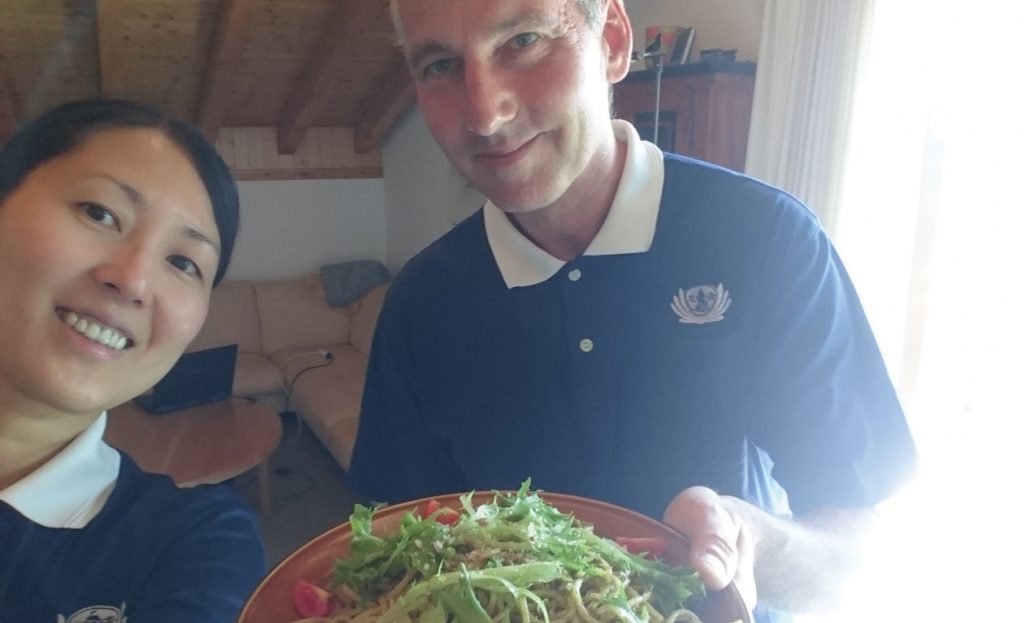
Mea Feng Lin shared that “religious groups in the climate conference represent not only the religious communities in the world today, but also speak for three categories.” Namely, they must be a voice for the world’s poorest populations, living creatures who can’t speak for themselves, and the people of the future who have yet to be born, since the environment then will be the result of humanity’s way of life now.
Tzu Chi had the opportunity to team up with existing and new partners at COP26 to promote plant-based diets, jointly amplifying the necessity for a global transition to more sustainable food systems.
As a Buddhist organization, Tzu Chi clearly expressed the compassion of the Buddha and Dharma Master Cheng Yen in caring for all living things and the environment and promoting the concept of vegetarianism. Tzu Chi clearly stated that vegetarianism is a way that everyone can easily and quickly reduce greenhouse gas emissions. To reduce carbon, everyone should start by changing their own behavioral patterns. Everyone, every family, business, community, city, and country must understand that the urgency of the current global climate change isn’t just something to talk about, but a call for us to implement the proposed methods and solutions in action.
— Mea Feng Lin
There were some welcome signs of growing environmental awareness for those who had been to previous COP summits. For example, the organizers had prepared reusable water bottles for delegates instead of the single-use plastic bottles offered before. And, at least 50% of the meals served at the conference were plant-based this year.
Still, once all was said and done, how did the team feel about the outcomes of COP26, the Glasgow Climate Pact?
Mixed Feelings
Mea Feng Lin recounted that “at the opening ceremony, General Assembly President Alok Sharma emphasized that the 26th Conference of the Parties of the United Nations Framework Convention on Climate Change is the ‘last and best hope’ for keeping the global warming range within 1.5 degrees Celsius in accordance with the Paris Agreement’s goals.” So, did this “last and best hope” bear fruit?
Tiffany Tu and Ashley Yong, relatively new to the global dialogue on climate, were somewhat upbeat in their assessments:
The Glasgow Climate Pact is a good start and a goal that we must strive towards, however, there needs to be a gap between the goal and having the policies and strategies to get to the goal. As global citizens, it’s vital for us to educate ourselves on these goals and implement them into our daily lives.
— Tiffany Tu
I think holding the agreement accountable is the most important thing. Personally, I think there is a need to talk more about the strategies rather than only making commitments. However, it’s also great to see many countries have promised to at least do something.
— Ashley Yong
Jan Wolf, Mea Feng Lin, and Jimmy Yang, with several summits behind them, had more reservations about the outcomes:
There is progress but it’s not enough. Unfortunately, it wasn’t possible to achieve more and time is running out. You need to understand that these negotiations can only move to the right direction if some major players are willing to work together and to take the right actions.
— Jan Wolf
Lin agreed and elaborated further on the need for collaboration and consensus:
Most member states are willing to face the disaster brought about by climate change and agree that humans need to improve the current situation of producing large amounts of greenhouse gases. Still, not every country has the same consensus. Although we’ve seen the human crisis, we haven’t been able to lay down the country’s interests. Or, we’ve felt that carbon reduction is necessary but are unwilling to implement large-scale or rapid carbon reduction measures and use carbon neutrality to pretend to be net-zero. ‘Emissions,’ a mentality like this, has also caused the meeting to end while truly clear provisions and measures have not been produced.
— Mea Feng Lin
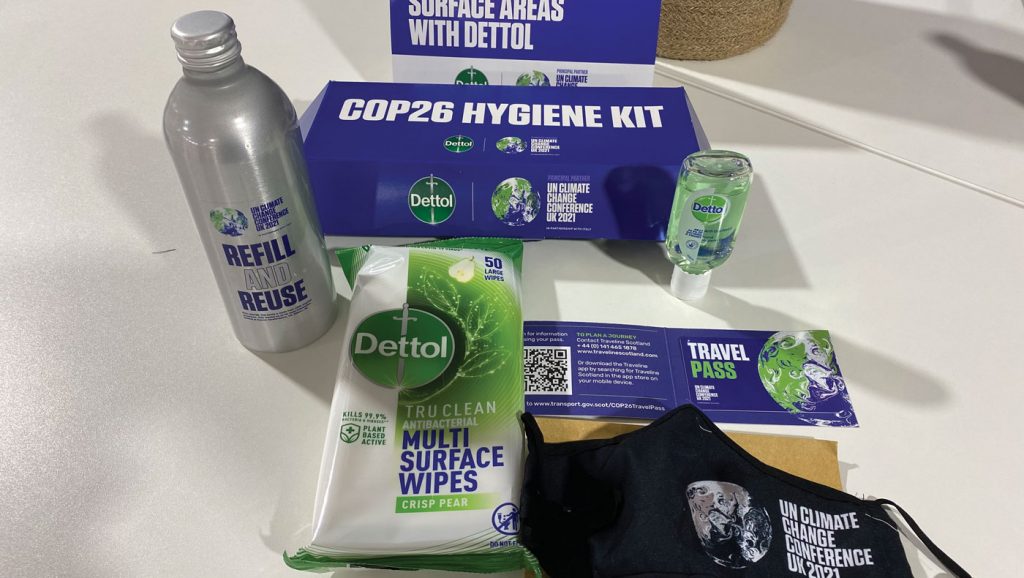
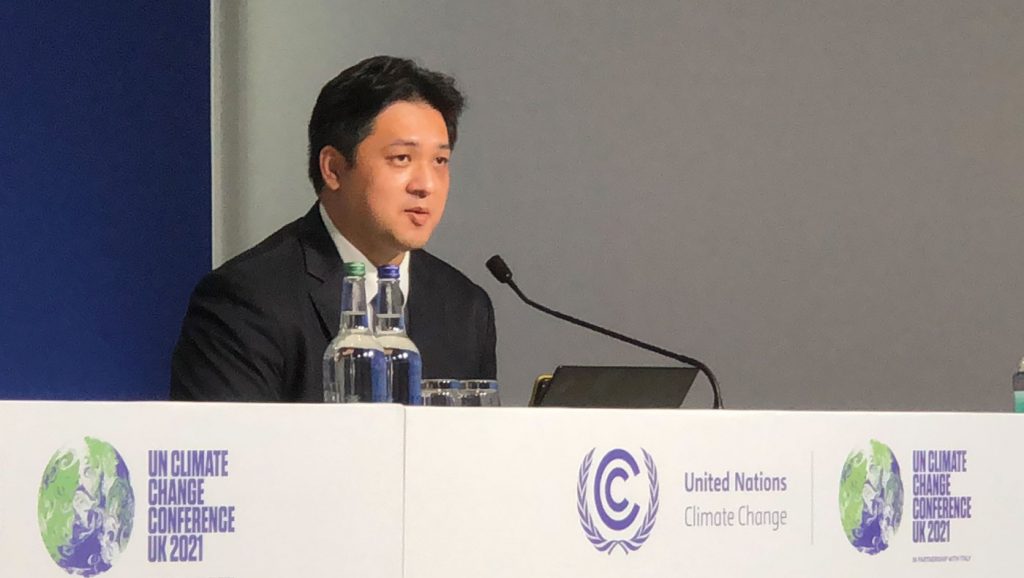
As for Jimmy Yang, while he applauded the agreements reached (summarized on page 33, at the end of this issue’s cover story), he also detailed his misgivings:
Even with the most generous estimates and assuming all the commitments and promises made from different countries at the conference would be successfully reached, it would still not be enough to reach the goal of limiting warming to 1.5°C above pre-industrial levels – a necessary limit to avert global catastrophe. Another major disappointment of the Glasgow Climate Pact is that much of the language had been watered down, downplaying the urgency for action and weakening language for countries to make more ambitious commitments. [For instance] the language on coal had been watered down dramatically … from an urge to ‘phase-out’ of coal power to a ‘phase-down.’ [A] major decision on the Warsaw International Mechanism for Loss and Damage – a contentious topic at the COP for years, which puts the responsibility on developed countries to ‘pay compensation’ for irreversible damages done to developing countries due to climate change – [was also blocked]. Another disappointment is the lack of mention of food and agriculture. Lastly, the failure to mobilize the financial commitments of $100 billion a year by 2020, though expected, is nonetheless a significant setback for progress.
— Jimmy Yang
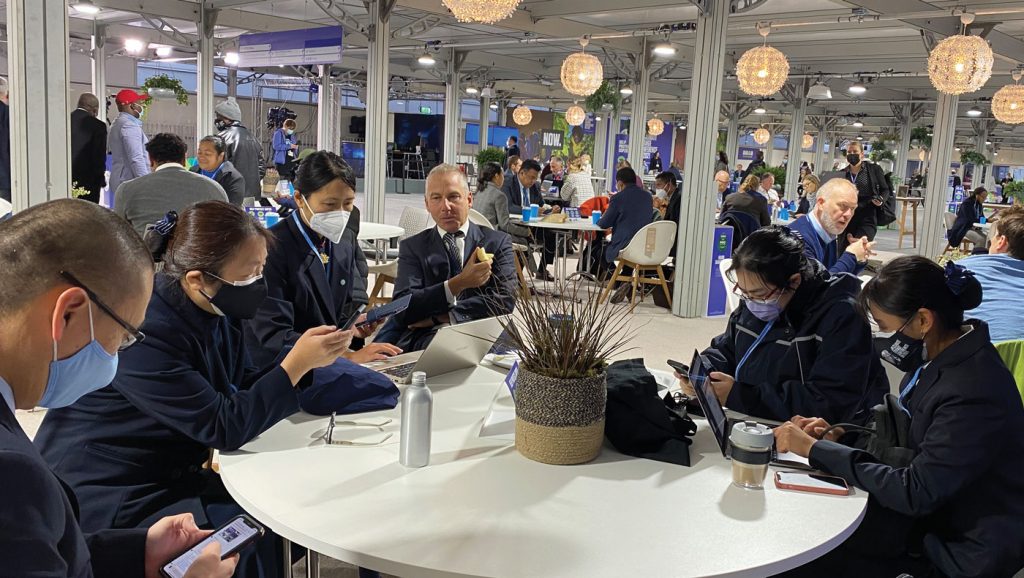
A Commitment to Advocacy and Personal Action
Participating in the COP26 global dialogue on climate change is just one aspect of the Tzu Chi SDG Action Team’s resolve to help deter climate change through personal action and advocacy. Nonetheless, they gained knowledge and drew insights and inspiration from the experience, spurring further action.
I’ve picked up a lot of knowledge by attending conferences on climate change – especially on the impact of the actions of individuals in their daily life on the environment and the effects of our consumer habits on greenhouse gas emissions. This knowledge has also had a significant impact on my personal lifestyle in many ways.
— Jan Wolf
Jan’s wife, Mea Feng, explained more about the couple’s mindful lifestyle, which is continually evolving:
We like the challenge of a low-carbon life. We usually walk or use bicycles as much as possible wherever we can. My husband’s bicycle has been used for nearly 35 years. If you look at the furniture at home, you can see that almost all have been used for more than decades, and even have a history of hundreds of years. This kind of treasure can not only extend life. It’s also a good way to reduce garbage and not waste the earth’s resources. In addition, it may also be worth thinking about the way the food is prepared, from the ingredients (plant-based vegetarian is the most carbon-efficient), the source of the food (you need to pay attention to choosing local ingredients in season), and the way of cooking. Water consumption? Cooking time? Even the cleaning at the end (how much water or detergent is used, etc.). This is all that everyone can think about and maybe find that there is still room for improvement!
— Mea Feng Lin
For her part, Ashley Yong is making a concerted effort in her lifestyle choices, planning to do even more, and hoping to encourage others to as well:
I’ve continued my effort in reducing my carbon footprint through plant-based diet adoption, avoiding waste generation, and reducing electrical consumption. Participating in COP has also inspired me to contribute more to climate change awareness-raising and education, especially in the younger generation, as I think it’s very critical for future leaders to understand the climate emergency. I’ll also share the usefulness and benefit of reusable and zero waste products with the people around me [and] encourage my friends and family to pay more attention to climate change issues.
— Ashley Yong
As a veteran of COP summits, this being his seventh, Jimmy Yang shared a very nuanced point of view on tackling climate change, one where individual agency as well a broad systemic transformation must play a part:
Before my involvement at COP, my views on environmentalism had been rather naïve. I had thought if we all did our part in recycling, cleaning up our environment, reducing our energy usage, and eating sustainably, the problem would be solved. [However] as I took the time to talk to different people, listen to their stories, experienced other cultures, and delved deeper into research, I found the issue to be quite a bit more complex. In actuality, it’s the systems in place that are the primary contributors to the climate crisis – at the heart of it all are uncontrolled growth capitalism, the constant need to consume energy, our cultures and beliefs, and even human nature itself. There are no one-size-fits-all solutions to the climate crisis – all ideas must be put on the table; even the smallest of actions make a difference. Change requires not only collective individual actions and awareness, it also requires us to think completely differently and critically about the way we live our lives, and yes, even getting political. Indeed, individual actions … demonstrate moral character, discipline, awareness, and dedication to climate action. However, solving the crisis requires a complete reevaluation of the values in our modern lifestyle and a total restructuring of society.
— Jimmy Yang
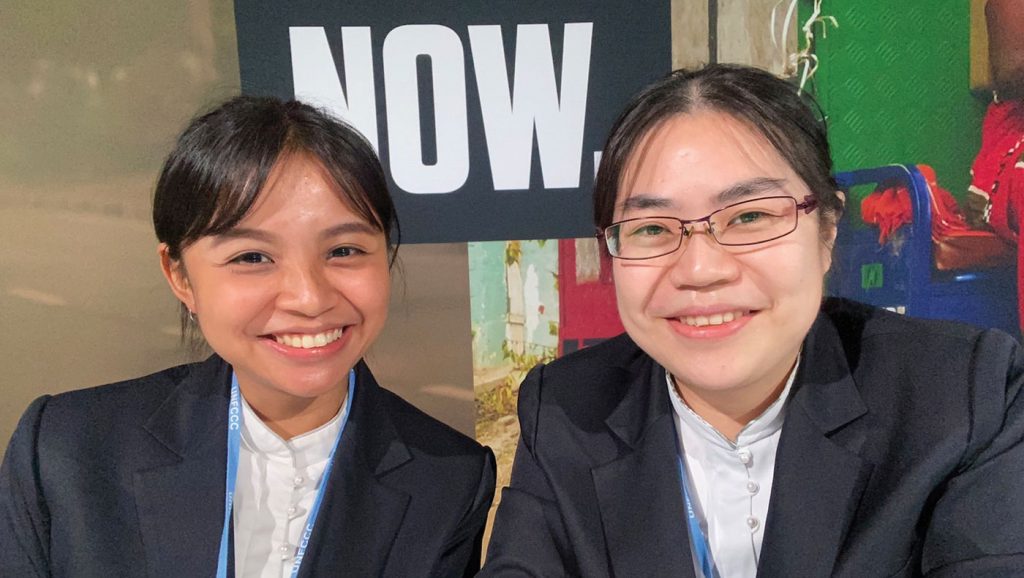
For COP newcomer Tiffany Tu, it boils down to being a light, and joining forces in solidarity with others to illuminate the way forward, because lasting change can start one action at a time:
As Dharma Master Cheng Yen has recently said, ‘We must take inventory of our lives and embody the spirit of the firefly.’ We must reflect on the carbon emissions in our daily lives and make reductions. At the same time, we mustn’t think less of ourselves; we need to be the voice for nature and our Earth. Like the firefly with its small light brightening up the dark sky, our reach or strength may not be big, but we can still make an impact in our communities and beyond. The world needs many little fireflies because, together, we can shine and guide others to walk on the same path.
— Tiffany Tu
SHARE:
Read more about Master Cheng Yen’s fireflies analogy in the teachings section on page 58.

